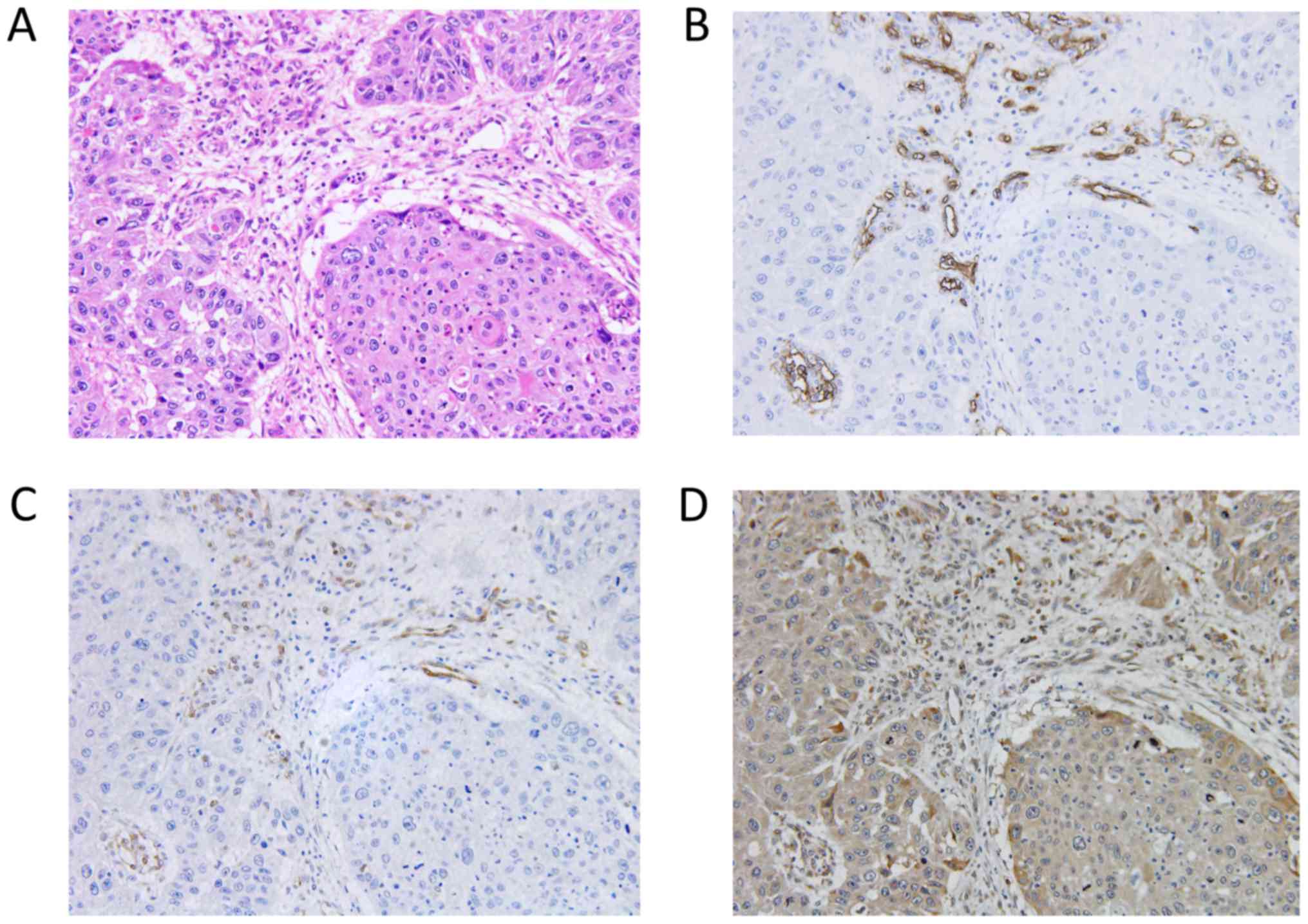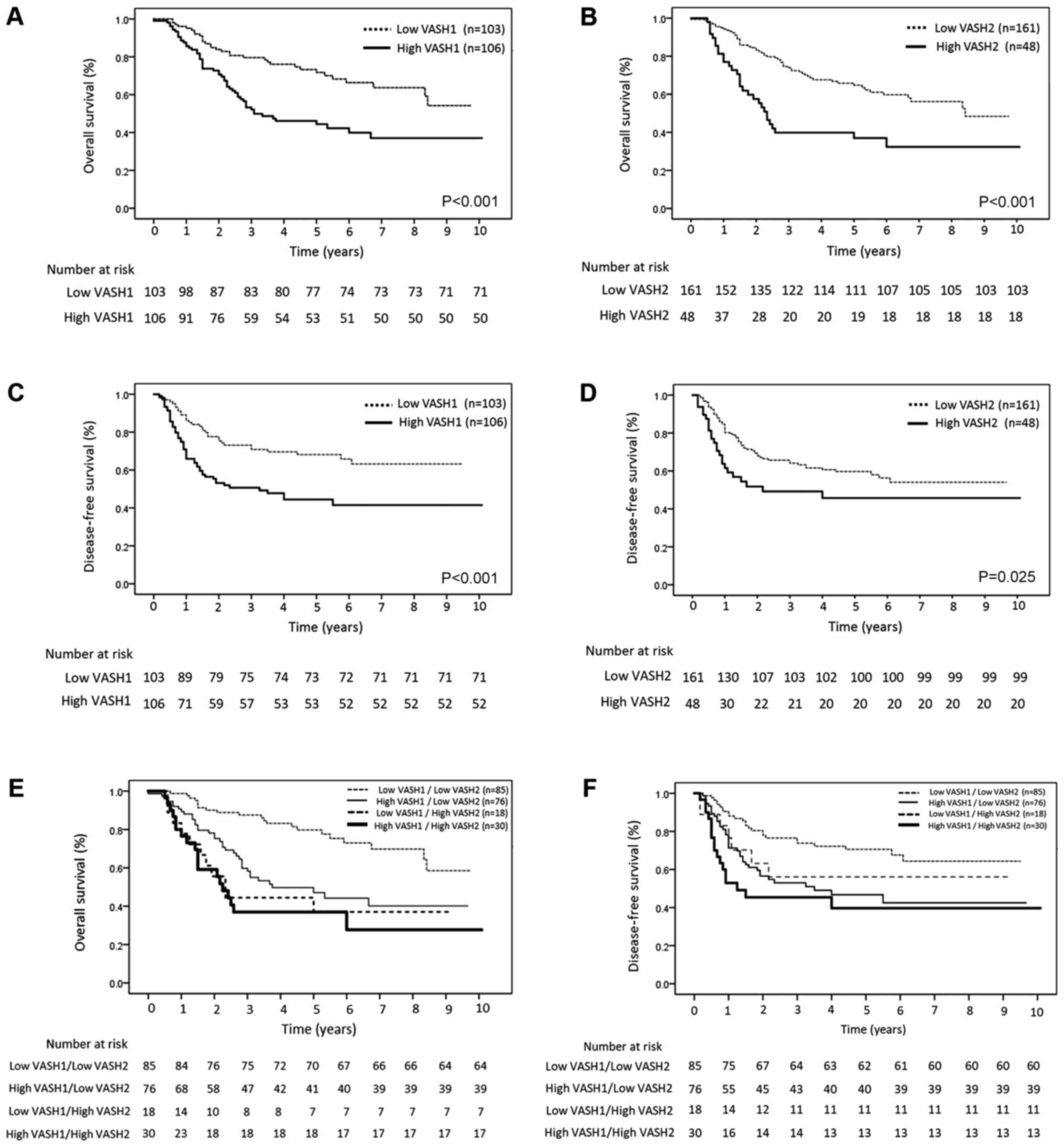|
1
|
Tachimori Y, Ozawa S, Numasaki H,
Fujishiro M, Matsubara H, Oyama T, Shinoda M, Toh Y, Udagawa H and
Uno T; Registration Committee for Esophageal Cancer of the Japan
Esophageal Society, : Comprehensive registry of esophageal cancer
in japan, 2009. Esophagus. 13:110–137. 2016. View Article : Google Scholar : PubMed/NCBI
|
|
2
|
Ito Y, Miyashiro I, Ito H, Hosono S,
Chihara D, Nakata-Yamada K, Nakayama M, Matsuzaka M, Hattori M,
Sugiyama H, et al: Long-term survival and conditional survival of
cancer patients in Japan using population-based cancer registry
data. Cancer Sci. 105:1480–1486. 2014. View Article : Google Scholar : PubMed/NCBI
|
|
3
|
Ellis LM and Hicklin DJ: VEGF-targeted
therapy: Mechanisms of anti-tumor activity. Nat Rev Cancer.
8:579–591. 2008. View
Article : Google Scholar : PubMed/NCBI
|
|
4
|
Shih C, Ozawa S, Ando N, Ueda M and
Kitajima M: Vascular endothelial growth factor expression predicts
outcome and lymph node metastasis in squamous cell carcinoma of the
esophagus. Clin Cancer Res. 6:1161–1168. 2000.PubMed/NCBI
|
|
5
|
Takeuchi H, Ozawa S, Shih CH, Ando N,
Kitagawa Y, Ueda M and Kitajima M: Loss of p16INK4a expression is
associated with vascular endothelial growth factor expression in
squamous cell carcinoma of the esophagus. Int J Cancer.
109:483–490. 2004. View Article : Google Scholar : PubMed/NCBI
|
|
6
|
Watanabe K, Hasegawa Y, Yamashita H,
Shimizu K, Ding Y, Abe M, Ohta H, Imagawa K, Hojo K, Maki H, et al:
Vasohibin as an endothelium-derived negative feedback regulator of
angiogenesis. J Clin Invest. 114:898–907. 2004. View Article : Google Scholar : PubMed/NCBI
|
|
7
|
Sato Y: The vasohibin family: Novel
regulators of angiogenesis. Vascul Pharmacol. 56:262–266. 2012.
View Article : Google Scholar : PubMed/NCBI
|
|
8
|
Kimura H, Miyashita H, Suzuki Y, Kobayashi
M, Watanabe K, Sonoda H, Ohta H, Fujiwara T, Shimosegawa T and Sato
Y: Distinctive localization and opposed roles of vasohibin-1 and
vasohibin-2 in the regulation of angiogenesis. Blood.
113:4810–4818. 2009. View Article : Google Scholar : PubMed/NCBI
|
|
9
|
Shimizu K, Watanabe K, Yamashita H, Abe M,
Yoshimatsu H, Ohta H, Sonoda H and Sato Y: Gene regulation of a
novel angiogenesis inhibitor, vasohibin, in endothelial cells.
Biochem Biophys Res Commun. 327:700–706. 2005. View Article : Google Scholar : PubMed/NCBI
|
|
10
|
Tamaki K, Moriya T, Sato Y, Ishida T,
Maruo Y, Yoshinaga K, Ohuchi N and Sasano H: Vasohibin-1 in human
breast carcinoma: A potential negative feedback regulator of
angiogenesis. Cancer Sci. 100:88–94. 2009. View Article : Google Scholar : PubMed/NCBI
|
|
11
|
Murakami K, Kasajima A, Kawagishi N,
Sekiguchi S, Fujishima F, Watanabe M, Sato Y, Ohuchi N and Sasano
H: The prognostic significance of vasohibin 1-associated
angiogenesis in patients with hepatocellular carcinoma. Hum Pathol.
45:589–597. 2014. View Article : Google Scholar : PubMed/NCBI
|
|
12
|
Miyazaki Y, Kosaka T, Mikami S, Kikuchi E,
Tanaka N, Maeda T, Ishida M, Miyajima A, Nakagawa K, Okada Y, et
al: The prognostic significance of vasohibin-1 expression in
patients with upper urinary tract urothelial carcinoma. Clin Cancer
Res. 18:4145–4153. 2012. View Article : Google Scholar : PubMed/NCBI
|
|
13
|
Kosaka T, Miyazaki Y, Miyajima A, Mikami
S, Hayashi Y, Tanaka N, Nagata H, Kikuchi E, Nakagawa K, Okada Y,
et al: The prognostic significance of vasohibin-1 expression in
patients with prostate cancer. Br J Cancer. 108:2123–2129. 2013.
View Article : Google Scholar : PubMed/NCBI
|
|
14
|
Kitajima T, Toiyama Y, Tanaka K, Saigusa
S, Kobayashi M, Inoue Y, Mohri Y and Kusunoki M: Vasohibin-1
increases the malignant potential of colorectal cancer and is a
biomarker of poor prognosis. Anticancer Res. 34:5321–5329.
2014.PubMed/NCBI
|
|
15
|
Zhang T, Yu TT, Zhang DM, Hou XM, Liu XJ,
Zhao D and Shan L: Vasohibin-1 expression detected by
immunohistochemistry correlates with prognosis in non-small cell
lung cancer. Med Oncol. 31:9632014. View Article : Google Scholar : PubMed/NCBI
|
|
16
|
Mikami S, Oya M, Kosaka T, Mizuno R,
Miyazaki Y, Sato Y and Okada Y: Increased vasohibin-1 expression is
associated with metastasis and poor prognosis of renal cell
carcinoma patients. Lab Invest. 13:854–862. 2017. View Article : Google Scholar
|
|
17
|
Torii C, Hida Y, Shindoh M, Akiyama K,
Ohga N, Maishi N, Ohiro Y, Ono M, Totsuka Y, Kitagawa Y, et al:
Vasohibin-1 as a novel prognostic factor for head and neck squamous
cell carcinoma. Anticancer Res. 37:1219–1225. 2017. View Article : Google Scholar : PubMed/NCBI
|
|
18
|
Kim JC, Kim KT, Park JT, Kim HJ, Sato Y
and Kim HS: Expression of vasohibin-2 in pancreatic ductal
adenocarcinoma promotes tumor progression and is associated with a
poor clinical outcome. Hepatogastroenterology. 62:251–256.
2015.PubMed/NCBI
|
|
19
|
Japan Esophageal Society, . Japanese
classification of esophageal cancer, 11th edition: Part I.
Esophagus. 14:1–36. 2017. View Article : Google Scholar : PubMed/NCBI
|
|
20
|
Japan Esophageal Society, . Japanese
classification of esophageal cancer, 11th edition: Part II and III.
Esophagus. 14:37–65. 2017. View Article : Google Scholar : PubMed/NCBI
|
|
21
|
Koyanagi T, Suzuki Y, Komori K, Saga Y,
Matsubara S, Fujiwara H and Sato Y: Targeting human vasohibin-2 by
a neutralizing monoclonal antibody for anti-cancer treatment.
Cancer Sci. 108:512–519. 2017. View Article : Google Scholar : PubMed/NCBI
|
|
22
|
Yoshinaga K, Ito K, Moriya T, Nagase S,
Takano T, Niikura H, Sasano H, Yaegashi and Sato Y: Roles of
intrinsic angiogenesis inhibitor, vasohibin, in cervical
carcinomas. Cancer Sci. 102:446–451. 2011. View Article : Google Scholar : PubMed/NCBI
|
|
23
|
Weidner N, Semple JP, Welch WR and Folkman
J: Tumor angiogenesis and metastasis-correlation in invasive breast
carcinoma. N Engl J Med. 324:1–8. 1991. View Article : Google Scholar : PubMed/NCBI
|
|
24
|
Sato Y: Is vasohibin-1 more than
angiogenesis inhibition? J Biochem. 149:229–230. 2011. View Article : Google Scholar : PubMed/NCBI
|
|
25
|
Roviello G, Petrioli R, Marano L, Polom K,
Marrelli D, Perrella A and Roviello F: Angiogenesis inhibitors in
gastric and gastroesophageal junction cancer. Gastric Cancer.
19:31–41. 2016. View Article : Google Scholar : PubMed/NCBI
|
|
26
|
Reck M, von Pawel J, Zatloukal P, Ramlau
R, Gorbounova V, Hirsh V, Leighl N, Mezger J, Archer V, Moore N, et
al: Overall survival with cisplatin-gemcitabine and bevacizumab or
placebo as first-line therapy for nonsquamous non-small-cell lung
cancer: Results from a randomised phase III trial (AVAiL). Ann
Oncol. 21:1804–1809. 2010. View Article : Google Scholar : PubMed/NCBI
|
|
27
|
Kabbinavar FF, Hambleton J, Mass RD,
Hurwitz Hl, Bergsland E and Sarkar S: Combined analysis of
efficacy: The addition of bevacizumab to fluorouracil/leucovorin
improves survival for patients with metastatic colorectal cancer. J
Clin Oncol. 23:3706–3712. 2005. View Article : Google Scholar : PubMed/NCBI
|
|
28
|
Nasu T, Maeshima Y, Kinomura M,
Hirokoshi-Kawahara K, Tanabe K, Sugiyama H, Sonoda H, Sato Y and
Makino H: Vasohibin-1, a negative feedback regulator of
angiogenesis, ameliorates renal alterations in a mouse model of
diabetic nephropathy. Diabetes. 58:2365–2375. 2009. View Article : Google Scholar : PubMed/NCBI
|
|
29
|
Hosaka T, Kimura H, Heishi T, Suzuki Y,
Miyashita H, Ohta H, Sonoda H, Moriya T, Suzuki S, Kondo T and Sato
Y: Vasohibin-1 expression in endothelium of tumor blood vessels
regulates angiogenesis. Am J Pathol. 175:430–439. 2009. View Article : Google Scholar : PubMed/NCBI
|
|
30
|
Ho JW, Poon RT, Sun CK, Xue WC and Fan ST:
Clinicopathological and prognostic implications of endoglin (CD105)
expression in hepatocellular carcinoma and its adjacent
non-tumorous liver. World J Gastroenterol. 11:176–181. 2005.
View Article : Google Scholar : PubMed/NCBI
|
|
31
|
Saito M, Suzuki Y, Yano S, Miyazaki T and
Sato Y: Proteolytic inactivation of anti-angiogenic vasohibin-1 by
cancer cells. J Biochem. 160:227–232. 2016. View Article : Google Scholar : PubMed/NCBI
|
|
32
|
Takahashi Y, Koyanagi T, Suzuki Y, Saga Y,
Kanomata N, Moriya T, Suzuki M and Sato Y: Vasohibin-2 expressed in
human serous ovarian adenocarcinoma accelerates tumor growth by
promoting angiogenesis. Mol Cancer Res. 10:1135–1146. 2012.
View Article : Google Scholar : PubMed/NCBI
|
|
33
|
Xue X, Gao W, Sun B, Xu Y, Han B, Wang F,
Zhang Y, Sun J, Wei J, Li Z, et al: Vasohibin 2 is
transcriptionally activated and promotes angiogenesis in
hepatocellular carcinoma. Oncogene. 32:1724–1734. 2013. View Article : Google Scholar : PubMed/NCBI
|
|
34
|
Tu M, Lu C, Lv N, Wei J, Lu Z, Xi C, Chen
J, Guo F, Jiang K, Li Q, et al: Vasohibin 2 promotes human luminal
breast cancer angiogenesis in a non-paracrine manner via
transcriptional activation of fibroblast growth factor 2. Cancer
Lett. 383:272–281. 2016. View Article : Google Scholar : PubMed/NCBI
|
|
35
|
Norita R, Suzuki Y, Furutani Y, Takahashi
K, Yoshimatsu Y, Podyma-Inoue KA, Watabe T and Sato Y: Vasohibin-2
is required for epithelial-mesenchymal transition of ovarian cancer
cells by modulating transforming growth factor-β signaling. Cancer
Sci. 108:419–426. 2017. View Article : Google Scholar : PubMed/NCBI
|
|
36
|
Koyanagi T, Saga Y, Takahashi Y, Suzuki Y,
Suzuki M and Sato Y: Downregulation of vasohibin-2, a novel
angiogenesis regulator, suppresses tumor growth by inhibiting
angiogenesis in endometrial cancer cells. Oncol Lett. 5:1058–1062.
2013. View Article : Google Scholar : PubMed/NCBI
|
















